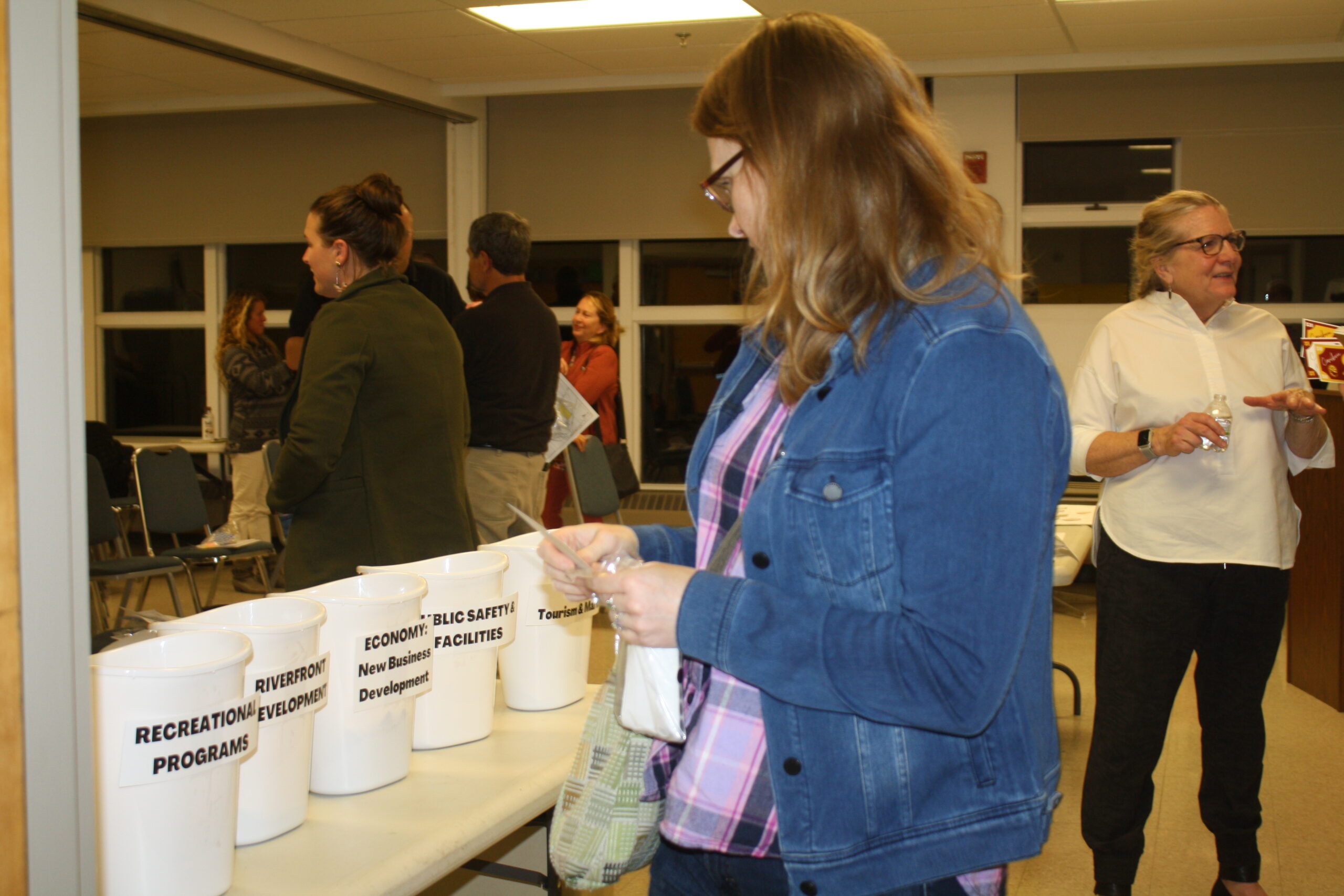
CARIBOU, Maine — For every benefit of living in Caribou, there are also many things keeping the city from fully serving residents, attracting new people and becoming a destination center for Aroostook and the state.
That’s what residents hoped city leaders would take away during Caribou’s first of many public gatherings focused on the city’s goals for the next decade.
Like many Aroostook communities, Caribou has struggled to attract larger industries and businesses since Limestone’s Loring Air Force Base closed nearly 30 years ago. In those decades, Caribou has become a major service center, with numerous repair shops, grocery stores, hardware and furniture stores, salons, spas, restaurants and medical services. The city has also drawn in snowmobile enthusiasts and attracted a record number of new families to the school district during the COVID-19 era.
But Caribou also has a largely undeveloped riverfront, no for-profit retail clothing stores, an affordable housing shortage, underutilized cultural centers and a growing drug problem. As the city looks toward the future, residents already agree that Caribou cannot grow without addressing those issues.
On Thursday, at least 50 residents attended the first public forum intended to launch Caribou’s latest comprehensive planning. Every 10 years, city leaders state their goals for economic and business development, recreation, education and housing, among other categories, in a formal plan that makes the city more eligible for state and federal funds.
Business and economic growth became a major focus during the informal discussion.
For instance, while Caribou’s existing businesses provide the most essential services, many residents still find themselves traveling 12 miles south to Presque Isle’s Walmart or JCPenney, especially for clothing, technology and household items.
In many ways, noted moderator and Caribou marketing consultant Bethany Zell, the city has become a bedroom community for residents who work at larger businesses in Presque Isle.
“Are we okay with that?” Zell asked the crowd. “Maybe we don’t need 15 department stores. Instead of thinking of Target, let’s think of what we usually get at Target and how we can bring those things here.”
While some debated whether Caribou could attract a big-box department store, most residents agreed that growing the city’s downtown and riverfront areas for residents and visitors should be priorities.
Caribou’s riverfront has been largely underutilized for business since the departure of agricultural factories and a long defunct steam and diesel plant. Though the area closest to the boat launch includes a vehicle repair shop, roofing company and new snowmobile storage units, many non-city-owned properties have become blighted and in need of demolition or clean up.
But all that unused property still contains potential, said Caribou native Melinda Barnard, who moved back to the city three years ago from Gardiner.
“Right now we don’t have a real destination center that can attract different people,” Barnard said.
Others agreed, and said that an indoor sports or outdoor concert venue could attract more regional competitions and events. Those who have been to downstate waterfronts highlighted ways that paved biking and walking trails, restaurants, boutique shops, hotels, campsites and civic centers attract visitors and encourage residents to remain in the area long term.
Louise Fode, a meteorologist at the National Weather Service, moved to Caribou in 2020 after working in Anchorage, Alaska. An outdoor recreation enthusiast, she agreed that more riverfront development could make Caribou a sought-after entertainment spot.
“I moved here in the middle of COVID when there wasn’t much [for entertainment], so I would like to see more arts events and shows here,” Fode said.
But to keep more residents in Caribou, many agreed that city officials should address people’s growing concerns about substance use disorder.
Jonathan Holabird, chairperson of the nonprofit Recovery Aroostook, said that the lack of addiction recovery services should be an issue that leaders address in the next decade.
Caribou has two recovery houses — one for men and another for women — and a resource center but, like other Aroostook towns, has no long-term recovery or detoxification facilities.
“Substance use is the biggest problem. We need to address it in small towns or else we’re not going to grow,” Holabird said. “Caribou has a chance to make recovery a lifestyle.”
With Caribou’s latest comprehensive plan in the works until 2024, Planning Board Chairperson Dan Bagley encouraged people to attend future meetings that will focus more exclusively on the topics discussed.
He said that the turnout and community engagement far exceeded expectations.
“I remember a meeting years ago when we only had half of the people here tonight,” Bagley said, while addressing the audience. “We’re going to need your input. Just because we don’t have a particular thing now, doesn’t mean we can’t have it in the future.”

CARIBOU, Maine — October 27, 2022 — Jonathan Holabird (front row, left) speaks about substance use issues in Caribou during a community forum held Thursday. At least 50 residents attended the meeting, which aimed to get community input on the city’s 10-year goals. (Melissa Lizotte | Aroostook Republican)

CARIBOU, Maine — October 27, 2022 — Caribou city councilor John Morrill (left) and Planning Board chair Dan Bagley kick off a community forum to discuss the city’s next 10-year goals. (Melissa Lizotte | Aroostook Republican)

CARIBOU, Maine — October 27, 2022 — Marketing consultant Bethany Zell reads phrases placed on a “Caribou Love Tree” during a community forum Thursday. Community members discussed things they love about Caribou and what issues still need to be addressed in the next decade. (Melissa Lizotte | Aroostook Republican)







